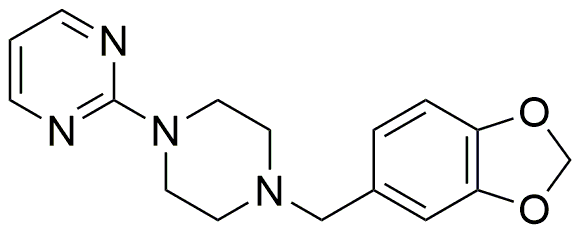Piribedil is widely utilized in research focused on:
- Parkinson's Disease Treatment: This compound is primarily used in the management of Parkinson's disease, helping to alleviate symptoms by acting as a dopamine receptor agonist.
- Neuroprotective Research: Researchers explore its neuroprotective properties, which may offer benefits in preventing neuronal damage in various neurodegenerative conditions.
- Pharmaceutical Development: It serves as a valuable reference compound in the development of new drugs targeting dopamine receptors, aiding in the creation of more effective therapies.
- Behavioral Studies: Piribedil is used in animal models to study the effects of dopamine modulation on behavior, providing insights into mental health disorders.
- Combination Therapies: Its potential in combination with other medications is being investigated to enhance therapeutic outcomes in patients with complex health conditions.
General Information
Properties
Safety and Regulations
Applications
Piribedil is widely utilized in research focused on:
- Parkinson's Disease Treatment: This compound is primarily used in the management of Parkinson's disease, helping to alleviate symptoms by acting as a dopamine receptor agonist.
- Neuroprotective Research: Researchers explore its neuroprotective properties, which may offer benefits in preventing neuronal damage in various neurodegenerative conditions.
- Pharmaceutical Development: It serves as a valuable reference compound in the development of new drugs targeting dopamine receptors, aiding in the creation of more effective therapies.
- Behavioral Studies: Piribedil is used in animal models to study the effects of dopamine modulation on behavior, providing insights into mental health disorders.
- Combination Therapies: Its potential in combination with other medications is being investigated to enhance therapeutic outcomes in patients with complex health conditions.
Documents
Safety Data Sheets (SDS)
The SDS provides comprehensive safety information on handling, storage, and disposal of the product.
Product Specification (PS)
The PS provides a comprehensive breakdown of the product’s properties, including chemical composition, physical state, purity, and storage requirements. It also details acceptable quality ranges and the product's intended applications.
Certificates of Analysis (COA)
Search for Certificates of Analysis (COA) by entering the products Lot Number. Lot and Batch Numbers can be found on a product’s label following the words ‘Lot’ or ‘Batch’.
Numéro de catalogue
Numéro de lot/série
Certificates Of Origin (COO)
This COO confirms the country where the product was manufactured, and also details the materials and components used in it and whether it is derived from natural, synthetic, or other specific sources. This certificate may be required for customs, trade, and regulatory compliance.
Numéro de catalogue
Numéro de lot/série
Safety Data Sheets (SDS)
The SDS provides comprehensive safety information on handling, storage, and disposal of the product.
DownloadProduct Specification (PS)
The PS provides a comprehensive breakdown of the product’s properties, including chemical composition, physical state, purity, and storage requirements. It also details acceptable quality ranges and the product's intended applications.
DownloadCertificates of Analysis (COA)
Search for Certificates of Analysis (COA) by entering the products Lot Number. Lot and Batch Numbers can be found on a product’s label following the words ‘Lot’ or ‘Batch’.
Numéro de catalogue
Numéro de lot/série
Certificates Of Origin (COO)
This COO confirms the country where the product was manufactured, and also details the materials and components used in it and whether it is derived from natural, synthetic, or other specific sources. This certificate may be required for customs, trade, and regulatory compliance.

